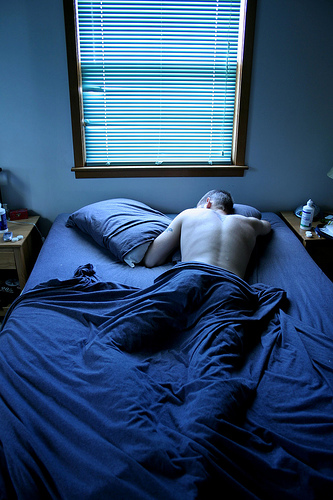Cataract surgeons discover aging eyes may impact our internal clock.
By age 65, about half of the population of the United States will have cataracts, with nearly everyone over the age of 75 having at least one. In fact, this common vision problem is currently the leading cause of blindness among older adults, and is protected to affect more than 30.1 million Americans by the year 2020. And the most frustrating part about cataracts? There is no real definite cause. In most cases, cataracts are simply just one of many problems that come along as part of the aging process.
 Several recent studies in ophthalmology and biological rhythms have linked aging eyes with a number of health concerns ranging from memory loss, insomnia, and depression to high cholesterol, obesity, inactive lifestyle, and even heart disease. However, one common aging problem that many ophthalmologists are beginning to take a significant interest in is the topic of insomnia and daytime sleepiness.
Several recent studies in ophthalmology and biological rhythms have linked aging eyes with a number of health concerns ranging from memory loss, insomnia, and depression to high cholesterol, obesity, inactive lifestyle, and even heart disease. However, one common aging problem that many ophthalmologists are beginning to take a significant interest in is the topic of insomnia and daytime sleepiness.
Fort Lauderdale surgeons Dr. Marc Bosem and Dr. Barry Concool at the CorrectVision Laser Institute have been looking closely at two common side-effects of seniors in the early stages of cataracts―the gradual yellowing of the eye’s lens and the narrowing of the pupil―and have found that, over time, these effects have been found to disturb the body’s circadian rhythm, which can ultimately lead to a range of medical complications due to its effect on the body’s regulatory and hormonal function.
Dr. Bosem says the body’s internal clock, helping it to start up in the morning and wind down at night, is regulated by blue light through photoreceptive cells that absorb sunlight and transmit messages to a part of the brain that governs circadian rhythm and releases the hormones melatonin and cortisol for proper function. However, as eyes age, he says their ability to receive blue light is diminished and the brain receives less of the messages it needs to control the internal clock.
Their study has gone on to find that cataract surgery works to replace the natural lens in the eye so that blue light reception is facilitated and can encourage the brain to react quicker and even improve one’s overall mood. Another study published in the Journal of Biological Rhythms has also found that exposure to blue light increased alertness and decreased sleepiness in young subjects whereas the subjection had no effect on older subjects.
It is because of this that Dr. Bosem and Dr. Concool say they have been recommending patients undergo eye exams if they experience certain symptoms such as sleep loss to detect the possibility of cataracts.
Another study conducted in Sweden for the Archives of Gerontology and Geriatrics suggests that patients who underwent cataract surgery experienced reduced incidence of insomnia and daytime sleepiness, while a study from the Princess Alexandra Eye Pavilion in Edinburgh shows an improved reaction time of the brain following cataract surgery.
However, as exciting and tempting as these findings may be, you should always be sure to consult a board-certified ophthalmologist and laser surgeon before undergoing any procedure. If you are interested in setting up a vision consultation to learn more about the benefits that cataract surgery can have for those suffering from the frustrating side effects of cataracts, be sure to contact OCLI today.
Image: Source